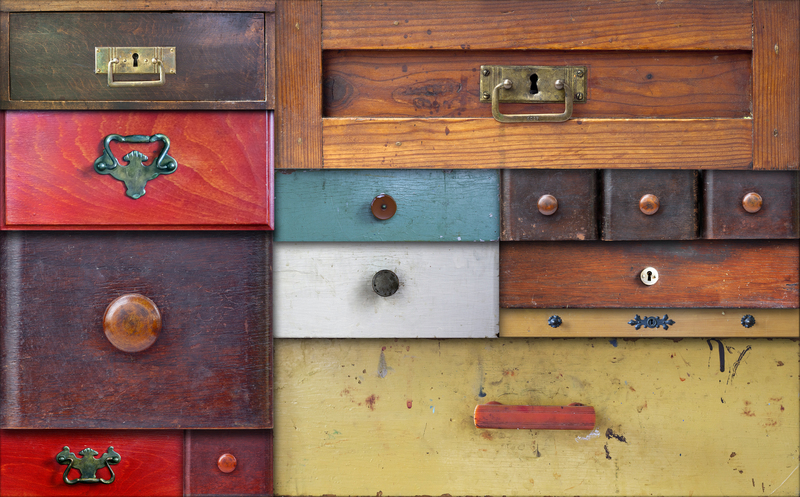Rediscover Peace of Mind by Tackling Clutter and Hoarding Challenges
In a rapidly moving world, the quest to rediscover peace of mind often begins at home. One of the greatest obstacles we face in achieving serenity is the clutter and chaos that creep into our living and working spaces. Clutter and hoarding challenges not only impact physical spaces but also have profound emotional and mental health implications. If you find yourself feeling overwhelmed by possessions, you are not alone. This comprehensive guide will explore practical strategies to help you conquer disorganization, break free from hoarding problems, and ultimately reclaim your well-being and tranquility.

Understanding Clutter and Hoarding: What You Need to Know
Before diving into actionable steps, it's essential to grasp the difference between everyday clutter and chronic hoarding. While almost everyone accumulates clutter from time to time--think stacks of old magazines, overstuffed closets, or messy kitchen counters--hoarding is more complex and often characterized by excessive acquisition and an inability to discard items, regardless of their value. Hoarding can lead to unsafe, unsanitary, and even dangerous living conditions.
- Clutter: Temporary disorganization of items, usually manageable with effort.
- Hoarding: Compulsive accumulation with significant distress in letting go, resulting in cramped and dysfunctional spaces.
Both situations can cause anxiety, stress, and poor quality of life. By tackling clutter and hoarding challenges head-on, you set the stage to rediscover peace of mind and foster a happier, healthier environment.
The Emotional Toll: How Clutter Drains Your Energy
What's lurking behind those piles of paper or collections of forgotten heirlooms? Often, it's a hidden emotional burden we may not even recognize. Numerous studies have found correlations between messy surroundings and increased stress, depression, and anxiety. Clutter is more than just a visual nuisance--it can stunt productivity, sap creativity, and strain relationships.
- Physical clutter can trigger feelings of overwhelm and guilt.
- Excessive possessions may lead to arguments among family members or roommates.
- Chronic disorganization can erode self-esteem and motivation.
By confronting clutter and hoarding issues, you liberate yourself from these negative cycles and make room--both physically and emotionally--for more joyful experiences.
Root Causes: Why We Accumulate and Struggle to Let Go
Understanding why clutter spirals out of control is crucial to achieving lasting change. For some, it relates to difficult life transitions, such as bereavement, divorce, or empty-nesting. For others, it may be a symptom of underlying conditions like ADHD, anxiety, or obsessive-compulsive disorder (OCD).
- Sentimental attachment: Holding on to items for emotional reasons.
- Fear of waste: A reluctance to discard things that might be useful "someday."
- Decision fatigue: Overwhelm regarding what to keep versus what to release.
- Perfectionism: Waiting for the "right" time or way to organize.
Recognizing these root causes is the first step on your journey to rediscovering your peace of mind and breaking the cycle of chronic clutter and hoarding.
Practical Steps to Tackle Clutter: Reclaim Your Space
You don't have to tackle everything at once. Decluttering is a process, not a one-time event. Try these proven strategies to transform your home and mindset:
1. Start Small, Win Big
Choose a single area--perhaps a closet, countertop, or junk drawer. Set a timer for 15-30 minutes and focus on that one space. Small victories generate momentum and immediate satisfaction, inspiring you to keep going.
2. Sort Items with the Four-Box Method
- Keep--Items you use frequently and truly need.
- Donate--Usable items that no longer serve you.
- Recycle--Papers, plastics, and metals that can be processed.
- Trash--Anything broken, expired, or unusable.
Applying this system room by room removes guesswork and simplifies decisions.
3. Establish Routines to Unclutter Your Life
Create daily or weekly habits:
- Tidy up surfaces each evening.
- Sort mail right away, recycling junk.
- Designate a "donation bin" for items you no longer want.
- Schedule regular decluttering sessions on your calendar.
Consistency is crucial to maintain a peaceful, organized environment.
4. Mindful Purchasing: Stop the Inflow
Resist the urge to acquire more stuff by asking yourself:
- Do I really need this?
- Does it serve a purpose or bring me joy?
- Can I borrow or rent instead of buying?
By mindfully controlling what enters your home, you prevent clutter from returning.
Addressing Hoarding: When You Need More Than Decluttering
For individuals facing severe hoarding problems, standard decluttering methods may not suffice. Hoarding disorder is a complex psychological condition that often requires compassionate, professional support. If you or a loved one struggles with letting go of even seemingly worthless items and lives in dangerously overcrowded conditions, it may be time to seek help.
Signs of Hoarding Disorder
- Persistent difficulty parting with possessions, regardless of value.
- Severe clutter that blocks walkways or exits.
- Living spaces are rendered unusable (e.g., kitchens, bathrooms).
- Emotional distress or family conflict caused by clutter.
Professional Help for Hoarding Challenges
Recovery is possible. Consider these resources:
- Therapists specializing in hoarding disorder: Cognitive-behavioral therapy (CBT) is particularly effective.
- Professional organizers with expertise in chronic disorganization.
- Support groups like Clutterers Anonymous.
- Local social services for safety risks or housing concerns.
Working with a trained professional can help address the root emotional triggers and strategize manageable steps to overcome hoarding tendencies.
Rediscovering Peace of Mind: The Benefits of an Organized Life
Why invest time and energy in conquering clutter and hoarding challenges? Because the results are lifechanging:
- Reduced anxiety and stress: Clear spaces create a calm, welcoming environment.
- Greater productivity and focus: An organized area fuels creativity and lessens distraction.
- Improved relationships: Shared spaces foster harmony and cooperation.
- Safety and hygiene: Clutter-free homes minimize accidents and health hazards.
- Sense of control: Taming your space restores confidence and peace of mind.
Beyond the visible effects, regaining control over your possessions helps you rediscover who you are beyond your material things--making space for cherished memories, meaningful activities, and future dreams.
Maintaining a Clutter-Free Home: Long-Term Tips
Clearing clutter is only the beginning. Staying organized is a lifelong journey. Here's how to maintain your peaceful, clutter-free environment:
- One in, one out rule: Every new item replaces an old one."
- Regular reviews: Seasonally reassess clothing, paperwork, and household items.
- Assign everything a home: When every item has a place, it's easier to tidy up.
- Stay vigilant: Watch for accumulating piles and address them quickly.
- Celebrate progress: Acknowledge your efforts and reward yourself.
*Remember: Consistency beats perfection*. It's okay to have setbacks--just return to your routines and stay committed to rediscovering your peace of mind one step at a time.

Clutter and Hoarding: Frequently Asked Questions
What is the main difference between clutter and hoarding?
While both clutter and hoarding involve the accumulation of items, clutter is typically temporary and manageable. Hoarding is a persistent inability to part with possessions, causing distress and creating health or safety risks.
How does clutter affect mental health?
Clutter can increase stress, anxiety, and depression, reducing your ability to relax, focus, and enjoy your living environment. By managing clutter, you promote emotional well-being.
What are some quick ways to reduce clutter?
- Start small with a single area or drawer.
- Implement the four-box method: keep, donate, recycle, or trash.
- Spend 10-15 minutes a day tidying high-traffic zones.
When should I seek professional help for hoarding?
If clutter has made spaces unusable, created hazardous conditions, or caused significant distress or disruption, contact a licensed therapist, organizer, or social services agency with experience in hoarding disorders.
How do I help a loved one facing hoarding challenges?
Offer compassion, avoid judgment, and encourage small steps. Support them in seeking professional help and accompany them through their decluttering journey.
Rediscover Serenity Today: Your Clutter-Free Journey Starts Now
You deserve a home that nurtures your soul and boosts your well-being. By intentionally tackling clutter and hoarding challenges, you start on the path toward clarity, tranquility, and happiness. Rediscover peace of mind by making incremental changes today--and savor the freedom and confidence of a harmonious, organized home tomorrow.
- Start with baby steps--progress builds over time.
- Remember that your possessions don't define you.
- Seek support if the process becomes overwhelming.
Rediscover peace of mind today by tackling clutter and hoarding issues--your future self will thank you!
